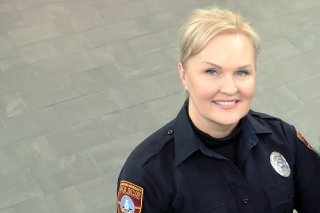Breaking down barriers in law enforcement
Bloomsburg
Posted

As a 22-year veteran in law enforcement, including the last 12 as a Bloomsburg University police officer, Sergeant Heather Comstock has to overcome some of the stereotypes of a female in the field. But as the first woman to earn the rank of sergeant at BU, she is proud of all she has accomplished.
Comstock spent part of her youth in Northeast Philadelphia before her family moved to Stillwater, near Benton, in northern Columbia County. After graduating from Northwest High School, she graduated from the Municipal Police Officer Academy in 1993 and also served nine years in the U.S. Air Force Reserves, earning the rank of sergeant in the transportation division.
“My job in the USAF reserves was to coordinate the loading and unloading of aircraft with secondary duties in law enforcement as needed,” said Comstock. “I received my associate’s degree from the USAF Academy in 2006 in applied science. When BU started the MAC-RB (Military Academic Credit Review Board) program, I enrolled in the criminal justice program and graduated cum laude in 2019.”
“Earning my degree from BU wasn’t easy,” said Comstock. “I could fit in just taking one or two classes at a time, usually in the morning, before I had to get ready for my shift.”
While women are more commonplace on police forces now when Comstock started that wasn’t the case.
“Municipalities just weren’t hiring women in those days,” Comstock says. “It was frustrating, but I never gave up. Then, when I was hired, I was given duties like child car seat checks, school resource officer, or victims assistance programs.”
“Today, though, it’s an amazing time to be a female in law enforcement and the recruiting efforts are welcoming females into the profession acknowledging that we have a particular skill set. I am very happy to see this progress,” said Comstock.
At Bloomsburg, Comstock does a variety of jobs within the department. She serves as a field officer; taser instructor; student internship director; runs the R.A.D program (Rape, aggression, and Defense) Women’s Self-Defense Program Community Policing; manages the Community Policing Officer program; and is a member of the Columbia county Drug task force and oversee the drug cases for the University.
While the role of an officer is to enforce the law or to write out a ticket for a traffic violation, the interaction with the public can lead to some surprising happenings.
“If I had to pick one that is personally rewarding – I would say when someone you helped or someone that was angry with you during an arrest, takes the time to contact you after the incident and say thank you,” says Comstock. “It comes out of the blue, but it always seems to be a day that I really needed to hear it. It has a way of re-setting your balance with the job.”
There are things that Comstock feels can help bring more females into the profession.
“As organizations or municipalities work to increase the number of females in their departments, I hope they remember a few things. They are:
- Don’t make policies or decisions for women without asking a woman for input. It’s counterproductive.
- Provide choices to attain personal goals in areas of law enforcement that we have an actual interest in. Don’t label or force us to be only community policing officers or Dare officers; let us work high risk, warrants, undercover drug work, and gangs. We have the same adrenaline rush and personal goals as male officers.
- Help create a work-life balance with our families and our children so we can stay and you can retain us. Sometimes women are afraid to ask for help in these areas because of a negative response.
- Make sure you have a maternity leave policy that explains the process of how they will keep their job and not have to choose between being a mother and serving your community.
- Help create a team environment, everyone wants to feel valued in the workplace, it’s not a gender issue. It’s a human issue.
In the end, though, while she may not consider herself a trailblazer, Heather Comstock is breaking down barriers for women in law enforcement here at Bloomsburg University.



